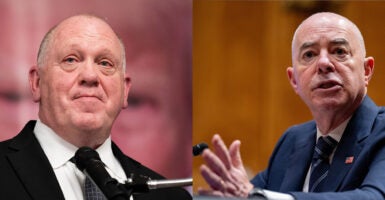During the Obama administration, Alejandro Mayorkas and Tom Homan had a positive working relationship. Not so much now.
Mayorkas, then director of U.S. Citizenship and Immigration Services, and Homan, then associate director of U.S. Immigration and Customs Enforcement, largely appeared to agree on immigration policy, as Homan recalls.
“I used to respect him,” Homan, tapped by President-elect Donald Trump to crack down on illegal immigration as border czar, said of Mayorkas during an interview Wednesday night with commentator Tucker Carlson.
“Under President Obama, I got a Presidential Rank Award … because I oversaw the removal of well over a million aliens during that three-year period,” Homan said on “The Tucker Carlson Show.”
“Mayorkas actually accompanied me on operations in New York City, targeting criminal aliens and illegal aliens both,” he added.
Mayorkas “backed me up” on removing illegal alien families during the Obama administration, Homan said.
“He shook hands of officers who were enforcing immigration law,” Trump’s new border czar told Carlson, adding that Mayorkas once went with him on a “huge operation [to] arrest a lot of illegal aliens.”
In November 2020, when Joe Biden tapped Mayorkas to head the Department of Homeland Security in his incoming administration, Homan recalled, he was optimistic that Mayorkas knew how to stop the flow of illegal immigrants across the southern border.
Mayorkas had seen how holding individuals and families in detention centers until their asylum cases could be heard was an effective tool to discourage illegal immigration, he said.
But when Mayorkas became DHS secretary in February 2021, Homan told Carlson, he took a “complete 180.”
“I don’t recognize him anymore,” Homan, who was acting director of ICE under Trump, said. “He’s about not enforcing the law.”
During his first year as Biden’s homeland security secretary, Mayorkas issued a memo to Immigration and Customs Enforcement explaining that ICE didn’t need to pursue arrests of migrants whose only crime was being in the country illegally.
“The fact an individual is a removable noncitizen therefore should not alone be the basis of an enforcement action against them,” Mayorkas told ICE officials in September 2021. “We will use our discretion and focus our enforcement resources in a more targeted way.”
“I don’t know what happened,” Homan replied when Carlson asked why he thought Mayorkas had seemingly changed his approach to U.S. immigration policy.
“All I know is a man who I once respected, I have zero respect [for] now because of what he did,” Trump’s border czar said. “Not, again, not because of incompetence. This is by design. They knew exactly what they were doing, because he’s been there before. He knows how we shut it down.”
But, he said, Mayorkas instead did “everything he could to unsecure the border.”
Over 10 million illegal aliens have entered the U.S. since Biden became president with Mayorkas leading DHS. Among those now here, over 660,000 illegal aliens either have been convicted of a crime or face pending criminal charges.
Trump and Homan have pledged to secure the border and launch a large deportation program, beginning with criminal illegal aliens.
Criminal illegal aliens will be targeted first for deportation, Homan said, “because they’re the most dangerous to our community—public safety threats and national security threats.”
Homan expressed frustration with city and state leaders such as Chicago Mayor Brandon Johnson, a Democrat, who say local police won’t work with ICE to deport illegal aliens.
ICE agents aren’t even allowed inside Chicago’s Cook County Jail, Homan lamented.
His former agency used to deport “hundreds of alien criminals” out of the jail, Homan said, but now some elected leaders would “much rather release that public safety threat back in the community to re-offend.”
Homan told Carlson that he has a message for Johnson and other leaders who refuse to cooperate with ICE on deportations: “You can choose not to help us. Stand aside, because we’re going to do it.”
“If you’re going to impede what we’re doing, that’s a felony,” he said. “If you’re going to knowingly harbor and conceal an illegal alien from ICE agents … that’s a felony, and we will prosecute.”
Homan explained that he is not asking local or state law enforcement to act as immigration officers, but instead to turn over custody of criminal illegal aliens to ICE after they serve their time in local or state prison.
Officials who don’t work with ICE in this capacity are “endangering the community, the immigrant community, because they are most likely to re-offend in that community,” he said. “You’re endangering our officers, and you’re endangering that alien because things could happen when you’re making arrests in the public setting.”
If illegal aliens are released onto the streets after doing time in a U.S. prison, Homan said, an ICE arrest in such a situation requires a team of federal agents for safety reasons. ICE agents are likely to find that criminal illegal alien staying with other illegal immigrants, he said, and regardless of the criminal history of those others, ICE agents will arrest them for deportation.
“So, we’re going to find the bad guy and anybody else around him,” Homan said. “So, by your actions and not letting me into that county jail means … a lot more agents in your neighborhood and a lot more arrests, and many nonpriority arrests. You want to play the game, we’re going to play the game.”
































2 Replies to “Tom Homan Tells Tucker Carlson He ‘Used to Respect’ Mayorkas ”